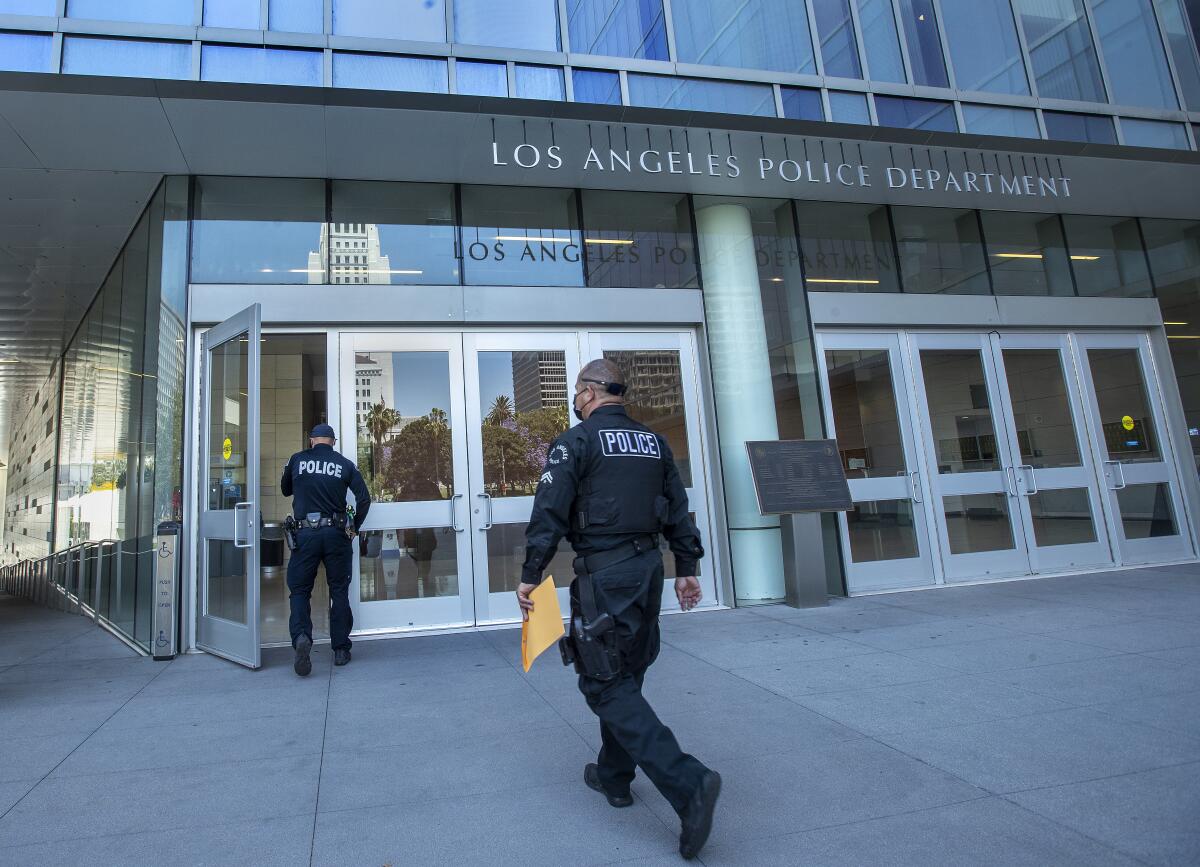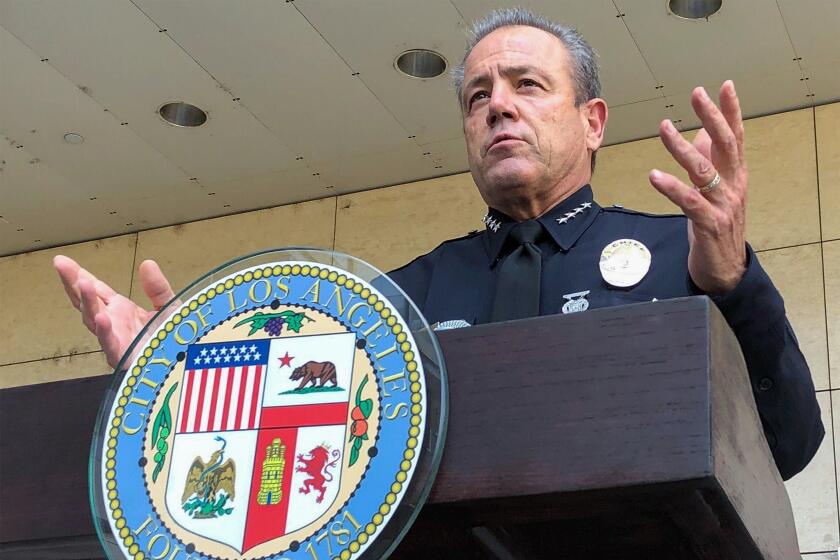LAPD seeks to fire 2 officers in gang unit suspected of turning off body cameras

The Los Angeles Police Department is seeking to fire two officers for misconduct that officials said was uncovered during an internal investigation of a San Fernando Valley gang unit, whose members are accused of routinely turning off their body cameras to conceal alleged misdeeds such as theft and falsifying reports.
LAPD Chief Michel Moore on Wednesday denied that an underlying pattern of problematic behavior exists within the department, saying a broad review he ordered “found no evidence that this type of misconduct extends to any other division in the City.”
“I know the vast majority of our officers go out every day to do outstanding work and they conduct themselves with integrity and reverence for the law,” Moore said in a statement. “The misconduct discovered is being addressed with urgency and certainty, and I will never tolerate actions that undermine the public’s trust and tarnish the badge we all so proudly wear.”
The growing controversy involving the Mission Division Gang Enforcement Detail, whose suspected wrongdoing has triggered a separate FBI investigation, has stirred speculation that the issues under scrutiny are more widespread than the department is letting on.
In a statement last week, the Los Angeles County public defender’s office said the revelations about the Mission officers reflect a larger pattern by LAPD officers who “prematurely deactivated their cameras or waited to turn them on until they’re making an arrest.”
Moore said that the controversy remains of “the highest priority” for the department, and that an internal affairs task force — consisting of a lieutenant and eight investigators — is “thoroughly investigating both potential criminal offenses and administrative violations of Department policy, as well as the full scope of the alleged concerns.” The Professional Standards Bureau, he said, had carried out “integrity audits across the Department,” which determined that the alleged misconduct “is limited to members of the Mission Area GED.”
The alleged misconduct came to light through an internal investigation of a traffic stop in December, when a motorist claimed police pulled him over and searched his vehicle without consent or probable cause. The department’s inquiry widened when investigators began to review other stops carried out by the unit, finding numerous instances where officers had improperly switched off their body-worn cameras or otherwise failed to document the encounter, in violation of department policy.
One of the central questions raised by the FBI’s announced investigation of an LAPD gang unit is whether department officials could or should have known about the alleged misconduct sooner.
Moore said last week that some gang officers were thought to have taken items from people during traffic stops, prompting internal affairs investigators to search their lockers at Mission station.
The unit has been in effect disbanded, with at least some of its officers placed on home assignment, the department said.
On Wednesday, the department confirmed that two of the unit’s officers were directed on Aug. 31 to a disciplinary hearing, known as a board of rights, facing potential termination.
Moore does not have the power to fire an officer for misconduct under the LAPD’s disciplinary system. Instead, when the chief believes firing is necessary, the officer is entitled to a hearing before a three-person board of rights panel. An officer can also request a board hearing to challenge a suspension or demotion issued by the chief.
The secretive hearings function much like mini-trials. After hearing evidence and witness testimony from both sides, a panel — consisting of two LAPD officers with the rank of captain or higher and one civilian or, increasingly, all civilians — comes to a decision about an officer’s guilt or innocence. If it finds an officer guilty, the panel can suggest discipline, but the final say on any penalties lies with the chief.
With officers increasingly opting to have their cases heard by all-civilian panels, which tend to be more lenient, Moore, Mayor Karen Bass and other top city officials have called for an overhaul of the current system. The police union has long argued that past chiefs were given too much power to discipline officers, which opened the door to abuse.
The department would not name the officers facing termination, nor provide any other biographical information, citing state privacy laws.
Times staff writer Richard Winton contributed to this report.
More to Read
Sign up for Essential California
The most important California stories and recommendations in your inbox every morning.
You may occasionally receive promotional content from the Los Angeles Times.











